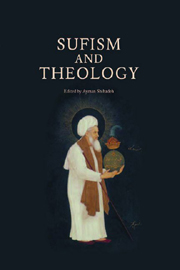Book contents
- Frontmatter
- Contents
- Contributors
- Acknowledgements
- Introduction
- Part I Mystical Theologies
- 1 Mystical Theology and the Traditionalist Hermeneutics of Maybudī's Kashf al-Asrār
- 2 The All-Comprehensive Circle (al-Iḥāṭa): Soul, Intellect, and the Oneness of Existence in the Doctrine of Ibn Sab'īn
- 3 One Aspect of the Akbarian Turn in Shī'ī Theology
- 4 Sufism and Theology in the Confessions of Ṣā'in al-Dīn Turka Iṣfahānī (d. 830/1437)
- 5 A Sufi Theology Fit for a Shī'ī King: The Gawhar-i Murād of 'Abd al-Razzāq Lāhījī (d. 1072/1661–2)
- Part II Theological Approaches to Sufism
- Index
3 - One Aspect of the Akbarian Turn in Shī'ī Theology
from Part I - Mystical Theologies
Published online by Cambridge University Press: 12 September 2012
- Frontmatter
- Contents
- Contributors
- Acknowledgements
- Introduction
- Part I Mystical Theologies
- 1 Mystical Theology and the Traditionalist Hermeneutics of Maybudī's Kashf al-Asrār
- 2 The All-Comprehensive Circle (al-Iḥāṭa): Soul, Intellect, and the Oneness of Existence in the Doctrine of Ibn Sab'īn
- 3 One Aspect of the Akbarian Turn in Shī'ī Theology
- 4 Sufism and Theology in the Confessions of Ṣā'in al-Dīn Turka Iṣfahānī (d. 830/1437)
- 5 A Sufi Theology Fit for a Shī'ī King: The Gawhar-i Murād of 'Abd al-Razzāq Lāhījī (d. 1072/1661–2)
- Part II Theological Approaches to Sufism
- Index
Summary
This chapter is a companion piece to an article published in 2004 in the journal Arabic Sciences and Philosophy. There I examined the history of one of Avicenna's (d. 428/1037) most famous contributions to the history of philosophy, his distinction between 'the necessary of existence in itself (wājib al-wujūd bi-dhātih) and ‘the necessary of existence through another’ (wājib al-wujūd bi-ghayrih, which Avicenna took to be convertible with ‘the possible of existence in itself’, mumkin al-wujūd bi-dhātih). I concluded that Avicenna's distinction can be fully understood only if it is placed in a kalām as well as a falsafa context. In particular, Avicenna's distinction seems to have been at least partly shaped by preceding theological debates about the ontological status of the divine attributes (ṣifāt). In contrast to the Mu'tazilīs, who believed that there was no real distinction between the divine attributes and the divine self (dhāt), the Sunnīs (especially the Ash'arīs and the Māturīdīs) maintained that the divine attributes (or at least a subset of them) enjoyed an eternal existence that was in some sense meaningfully distinct from that of God's self. The Sunnīs held this position partly because they were committed to the idea that the Qur'ān, understood as God's attribute of speech, was eternal rather than created. I argued that the conceptual challenge which this position on the divine attributes presented to the Sunnī mutakallimūn was analogous to the challenge facing Avicenna with respect to the ontological status of the eternal heavens: namely, finding some way of maintaining that there was a category of being that was eternal yet not uncaused.
- Type
- Chapter
- Information
- Sufism and Theology , pp. 49 - 62Publisher: Edinburgh University PressPrint publication year: 2007



